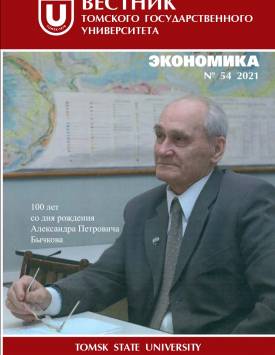Development of a Methodology for Evaluating Cryptocurrencies as a Promising Means of Payment in the Digital Economy
The article presents the main results of a study of cryptocurrency as a financial instrument of the future from the standpoint of various methodological approaches aimed at identifying trends in its functioning within the framework of the theory and practice of monetary circulation. The fundamental hypothesis of the study is the prospect of introducing cryptocurrency as a legitimate means of payment to replace the classical forms of money in the context of the transformation of the world economy. This study and its results will contribute to solving a global scientific problem - the formation of a scientifically grounded theoretical and statistical base in the context of the specifics of cryptocurrency’s functioning and the possibility of its functioning as a legitimate means of payment in the modern economy. The relevance of the article is determined by the need to reassess the existing monetary system along with financial mechanisms and operating institutions in view of the emerging crisis of confidence in the current system of state regulation of the economy. The scientific novelty of the article is determined by the development of modern economic theory from the standpoint of the functioning of cryptocurrency as a component of monetary circulation via approaches that study cryptocurrency as an alternative to outdated financial mechanisms. This work opens up an opportunity for further research in the field of cryptocurrency relations, its further improvement and implementation in the national financial system.
Keywords
cryptocurrency,
bitcoin,
correlation and regression analysis,
anti-money laundering measures,
AmL/CFT,
FATFAuthors
| Kuptsova Tatiana A. | Samara State University of Economics | agnia-7@mail.ru |
| Chaplygin Vladimir G. | WSB University in Gdansk | vchap-lygin@wsb.gda.pl |
Всего: 2
References
Инициативный всероссийский опрос «ВЦИОМ-Спутник» // ВЦИОМ. 2019. URL: https://wciom.ru/index.php?id=236&uid=9646 (дата обращения: 25.03.2020).
Генкин А. С. Частные деньги: осмысление роли и места в современном мире // Финансы и кредит. 2005. № 29 (197). С. 80.
Крылов О.М. К вопросу о правовой категории «денежный суррогат» // Финансовое право. 2012. № 9. С. 56-61.
Кузнецов В.А., Якубов А.В. О подходах в международном регулировании криптовалют (Bitcoin) в отдельных иностранных юрисдикциях // Деньги и кредит. 2016. № 3. С. 20-29.
Кузнецова О.А., Мазурмович О.Н. Эконометрика : практикум. Самара : Изд-во Самарского университета, 2019. 72 с.
Купцова Т.А. Теоретический аспект легализации криптовалюты в условиях российской экономики // Вестник Академии знаний. 2019. № 4 (33). С. 247-252.
Пашковская И.В. Перспективы развития национального денежного обращения в условиях цифровой экономики // Вестник евразийской науки. 2018. № 2. URL: https://esj.today/PDF/75ECVN218.pdf (дата обращения: 17.04.2020).
Петров П.К. Математико-статистическая обработка и графическое представление результатов педагогических исследований с использованием информационных технологий : учеб. пособие. Ижевск : Удмуртский университет, 2013. 179 с.
Попова Е.М., Бандурко С.А. Анализ финансовых рисков в криптоэкономике с учетом информационного влияния // Известия СПбГЭУ. 2017. № 6 (108). С. 36-40.
Программа «Цифровая экономика Российской Федерации» (утверждена распоряжением Правительства Российской Федерации от 28 июля 2017 г. № 1632-р). URL: http://static.govemment.ru/media/files/9gFM4FHj4PsB79I5v7yLVuPgu4bvR7M0.pdf (дата обращения: 24.03.2020).
Рейтинг криптовалют 2020 - онлайн-курс топ-10 в реальном времени. Список лучших криптомонет по капитализации и популярности // Profinvestment.com. URL: http://profinvestment.com/crypto-currency-rating (дата обращения: 19.04.2020).
Росфинмониторинг. Группа разработки финансовых мер по борьбе с отмыванием денег (ФАТФ). URL: http://www.fedsfm.ru/activity/fatf (дата обращения: 30.03.2020).
Уголовный кодекс Российской Федерации от 13.06.1996 № 63-ФЗ (ред. от 07.04.2020; с изм. и доп., вступ. в силу с 12.04.2020) // Собрание законодательства РФ. 1996. Вып. 25. URL: http://www.consultant.ru/document/cons_doc_LAW_10699/ 4dfcfc8807c829f92212ce92efe818c4a707a3ca (дата обращения: 19.04.2020).
Чаплыгин В.Г., Дельцова Т.А. Анализ взаимосвязи криптовалюты биткоин с использованием корреляционно-регрессионного анализа // Вестник Балтийского федерального университета им. И. Канта. Серия: Гуманитарные и общественные науки. 2018. № 2. С. 70-79.
Янковский Р. Цифровое законодательство в России: итоги 2019 г. // Адвокатская газета. 2019. URL: https://www.advgazeta.ru/mneniya/tsifrovoe-zakonodatelstvo-v-rossii-itogi-2019-g/(дата обращения: 23.03.2020).
Cryptocurrency Market Capitalizations // CoinMarketCap.com. URL: https://coinmarketcap.com/currencies/bitcoin (date of access: 24.03.2020).
Faghih Mohammadi Jalali M., Heidari H. Predicting changes in Bitcoin price using grey system theory // Financial Innovation. 2020. № 6. Р. 13. URL: https://doi.org/10.1186/s40854-020-0174-9 (date of access: 20.03.2021).
Giudici G., Milne A., Vinogradov D. Cryptocurrencies: market analysis and perspectives // J. Ind. Bus. Econ. 2020. № 47. Р. 1-18. URL: https://doi.org/10.1007/s40812-019-00138-6 (date of access: 19.03.2021).

